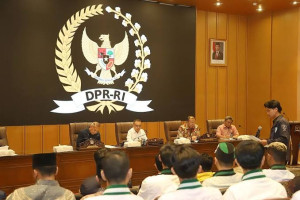Proposed Military Law revision raises concerns of democratic backslide
The Dwifungsi Doctrine
The Prabowo-Gibran administration faces growing criticism over its proposed revision of the Indonesian Military (TNI) Law, raising fears of a resurgence of the dual-function (Dwifungsi) doctrine and expanded military influence in civilian governance.
Implemented during Indonesia’s New Order era under President Suharto, the Dwifungsi doctrine assigned the Indonesian Armed Forces (ABRI) dual responsibilities: maintaining national security and participating in political and social affairs. This framework enabled military personnel to hold key positions in government institutions, public services, and state-owned enterprises. Following Suharto’s fall in 1998, the doctrine was gradually dismantled as Indonesia transitioned to democratic governance.
Key proposed amendments and criticism
A draft of the proposed amendments, obtained by the Civil Society Coalition for Security Sector Reform (Koalisi RSK), outlines several changes that critics argue could undermine democratic governance.
The revised Article 47(2) would permit active-duty TNI personnel to occupy civilian roles beyond the ten government institutions currently allowed by law. “This provision could retroactively justify previous military appointments made by President Prabowo, such as Major Teddy as Cabinet Secretary and Major General Novi Helmy as CEO of Perum Bulog, which were widely criticized for violating the existing TNI Law,” said Usman Hamid, Executive Director of Amnesty International Indonesia, on February 20, 2025. He warned that this move could weaken civilian control over the military and undermine democratic governance.
Hamid also noted that the proposed changes might legitimize military involvement in Prabowo’s civilian programs, including the Nutritious Free Meal (MBG) initiative, LPG distribution, food security, palm oil plantation security, National Strategic Projects (PSN), forest protection, and even Hajj pilgrimage management. The coalition expressed concern that these policies could lead to conflicts between the military and local or indigenous communities, increasing the risk of human rights violations.
However, some observers acknowledge that TNI involvement in select civilian projects, particularly those in remote and inaccessible areas, has played a practical role. Nonetheless, they stress the importance of establishing clear boundaries to prevent overreach and ensure that the military’s primary focus remains national defense.
Retirement age extension and political implications
Another contentious proposal involves raising the retirement age for military personnel, from 58 to 60 for officers and from 53 to 58 for enlisted personnel. The coalition argues that this change would strain the defense budget, slow career progression, and create a surplus of inactive officers who might be placed in civilian roles.
Additionally, Article 53(3) would grant the President authority to extend the tenure of four-star generals, raising concerns about political interference in military affairs. Critics worry that, given President Prabowo’s military background, this provision could serve political interests rather than promote TNI professionalism.
Calls for reform and oversight
The coalition has urged the government and Parliament to halt discussions on the revision and instead prioritize long-overdue military reforms, including:
- Establishing a Law on Military Assistance Tasks,
- Overhauling the military justice system,
- Restructuring territorial commands, and
- Strengthening independent oversight of the military.
If enacted, the proposed TNI Law revision could mark a setback for Indonesia’s democratic progress, raising concerns of renewed military dominance reminiscent of the New Order’s Dwifungsi doctrine. While military support in select civilian projects may offer practical benefits, establishing clear limits is essential to maintain the balance between national security and democratic governance.
Already have an account? Sign In
-
Start reading
Freemium
-
Monthly Subscription
20% OFF$29.75
$37.19/MonthCancel anytime
This offer is open to all new subscribers!
Subscribe now -
Yearly Subscription
33% OFF$228.13
$340.5/YearCancel anytime
This offer is open to all new subscribers!
Subscribe now







